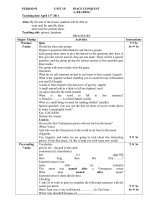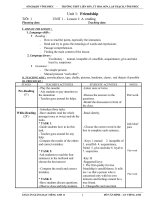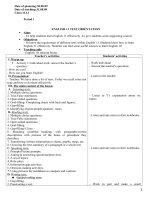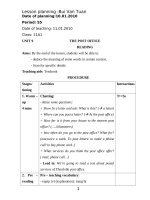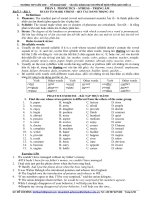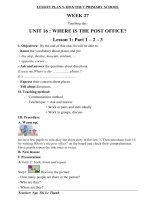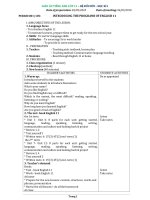Giáo án môn Tiếng Anh lớp 11 HK2 đầy đủ nhất
Bạn đang xem bản rút gọn của tài liệu. Xem và tải ngay bản đầy đủ của tài liệu tại đây (551.82 KB, 209 trang )
Lesson planning :Bui Van Tuan
Date of planning:10 .01.2010
Period: 55
Date of teaching: 11.01.2010
Class: 11A1
UNIT 9 THE POST OFFICE
READING
Aims: By the end of the lesson, students will be able to:
- deduce the meaning of some words in certain context.
- Scan for specific details
Teaching aids: Textbook
PROCEDURE
Stages/
timing
Activities Interactions
1. Warm –
up
4 mins
Chatting:
- Raise some questions:
+ Show Ss a letter and ask: What is this? (
a
letter)
+ Where can you post a letter? (
At the post office)
+ How far is it from your house to the nearest post
office? (… kilometters)
+ how often do you go to the post office? What for?
(one,twice a week. To post letters/ to make a phone
call/ to buy phone card )
+ What services do you think the post office offer?
( mail, phone call…)
- Lead in: We’re going to read a text about postal
services of Thanh Ba post office.
T↔Ss
2. Pre –
reading
Pre – teaching vocabulary:
- equip (v) (explanation): trang bị
Explanation: supply with what is needed in a
1
Lesson planning :Bui Van Tuan
10 mins company or an office…
- Express (a) (synonym) = very fast: rất nhanh, hỏa
tốc.
- Transfer (v) (explantion): chuyển
Explanation:: to hand over from one person or one
place to another.
- Notify (v) (translation): thông báo, cho biết
- recipient (n) (situation): người nhận
Situation: My friend sent me a letter. She was the
sender. I received the letter. I was the ….(reciepient)
- subscribe to (newspapers or magazines….) (v)
(explanation): đặt mua (báo) dài hạn
Explanation: arrange to receive
(newspapers/magazine )regularly
Checking: What and Where
Guessing: What services do Thanh Ba post office
offer to customers?
- Ask Ss to list out as many services as they know.
T↔Ss
3. While –
reading
20 mins
Activity 1: checking pridiction
- Ask Ss to read the text and check their prediction.
Answer keys:
• Mail and parce service
• Express monty transfer
• Phone calls and faxes
• Press distribution
- Ask some Ss to repeat
Activity 2: Wh- questions
- Ask Ss to read the text again and find the answers
to the following questions:
S↔S
S↔S
2
Lesson planning :Bui Van Tuan
1. what is Thanh Ba post office equipped with?
2. According to the text, what are the three ways of
sending a letter?
3. What is the Messenger call service used for?
4. What will you have to do if you want to get your
newspapers and magazines delivered to your house?
- Give feedback.
Expected answers:
1. It is equipped with advanced technology and a
spacious and pleasant front office.
2. They are sending letters by air, surface mail or
express mail.
3. Is it used for notifying the recipient of the time and
place to receive the call?
4. I’ll have to subscribe to my favorite newspapers or
magazines.
- Get Ss to practice asking and answering these
questions in open pairs, then in closed pairs
Acivity 3: Finding evidence in the text to support
these statements:
- Ask Ss to work in pairs again and find evidence in
the text that support these statements.
1. You cannot make a phone call at Thanh Ba
post office until 10 a.m.
2. you can save some money if you send a
parcel that is less than 15 kilos in weight.
3. The post office offers a special mail service
that is particularly fast.
T↔Ss
S↔S
3
Lesson planning :Bui Van Tuan
4. You relatives do not have to wait until
tomorrow to get the money you send them
today.
- Get Ss to report their answers chorally.
- Give feedack.
Expected answers:
1. It opens daily from 7 a.m to 9 p.m
2. They offer a very competitive rate for
parcels under 15 kilos.
3. They have Express Mail service and your
EMS mail will be delivered in the shortest
possible time
4. The money will sent in less than 24 hours.
Activity 4: Guessing meaning from context.
- Ask Ss to read the text individually, try to guess the
meaning of some words (spacious, courteous, speedy
and original) from the context and do exercise 1
(p.102)
- Get them compare their answers with their partners.
Answer keys:
The antonym of “specious” is “compared”
The antonym of “courteous” is “rude”
The antonym of “speedy” is “slow”.
The antonym of “original” is “changed”
T↔Ss
T↔Ss
S
S↔S
4. Post-
reading
10mins
Speak 4: Guessing meaning from context.
- Give some cues and ask them to make sentences
about Thanh Ba post office.
- write cues on the board
Ss↔Ss
4
Lesson planning :Bui Van Tuan
Cue 1: Advanced technology
S: Thanh Ba post office is equiped with advanced
technology.
Cue 2: staff
S: Their staff is well trained, thoughful and
courteous.
Cue 3: Mail and parcel services
S: They provide good mail and parcel services
Cue 4: Express money tranfer
S1: They will send your money in less than 24 hours.
Cue 5: Phone call and faxes
S: They have ordinay telephone call service and
messenger call service as well as fax transmissinon.
S2,S3….repeat
Cue 6: press distrubution
S1: They have newspaper or magazine delivery
service.
S2,S3…repeat.
- Ask Ss some Ss to repeat after each answer
- Tell the rest of the class what they know about
Thanh Ba post office using the cues on the board.
- Encourage Ss by giving them good marks.
5. Home
work
1 mins
Write –it- up
- ask Ss to write about Thanh Ba post office using the
cues above or their own words
=====================================Bui Van Tuan=====
Date of planning:10 .01.2010
Period: 56
Date 0f teaching:15.01.2010
Class: 11A1
5
Lesson planning :Bui Van Tuan
UNIT 9 THE POST OFFICE
SPEAKING
Aims: By the end of the lesson, students will be able to make requests and talk
about different postal services.
Teaching aids: Poster, textbook, CD player
PROCEDURE
Stages/
timing
Activities Interactions
1. Warm
- up
7 mins
Jumbled words:
- Give out a list of jumbled words (prepared beforhand
on a poster).
- Give Ss 2 minutes to prepare individually, and then
ask them to go to the board to write down the correct
words
- Give feedback
Answer keys:
1. mail 2. money transfer 3. fax 4. press delivery
- Ask: What are these? ( > postal services)
Introduce the lesson: Today we are going to talk about
some postal services.
T↔Ss
2. Pre-
speaking
10 mins
Listening task
- Give instruction:
A man is at the post office and he’s talking a postal
service. Listen for the first time and answer the
following questions:
T↔Ss
6
1. mali
2. money transfer
3. xaf
4. repss deervyli
Lesson planning :Bui Van Tuan
3. While
–
speaking
20 mins
1. What services is the man taking? ( >fax
transmission)
- Ask Ss to listen again and answers some more
questions:
2. What does he want to fax? ( > a document)
3. What’s his fax number? ( > 04.38974)
4. How much is this service? ( >5000dongs)
5. What exactly did the man say to make the request?
(could you help me to send this document to my office
by fax?)
- Ask Ss to give answers.
- Give feedback
Activity 1: controlled speaking
- Ask Ss to open their books (p.103) and practice the
dialogue between the man and the clerk in open pair,
then in closed pairs.
Activity 2: Mapped Dialogue
- Draw on the board two faces and intruduce the
scene:
This is Mr. Minh
This is the clerk at a post office
Mr. Minh wants to have a telephone line installed at
his home
- Elitcit the dialogue from Ss:
Good morning Good Can I
I’d telephone line installed
address?
S↔S
S↔Ss
7
Lesson planning :Bui Van Tuan
234 Tran Hung Dao St when ?
one week
Friday?
4. Post –
have telephone?
How much ?
fill in the form
here you are
thanks
- Get Ss to practice the dialogue in open pairs, the in
closed pairs.
Example dialogue:
B: Good morning
A: Good morning. Can I help You?
B: yes, I’d like to have a telephone line installed at
home, please
A: Yes, sir. What your address please?
B: 234 Tran Hung Dao street. When will it be
installed, please?
A: We’ll will make it ready one week after
registration.
B: Can you make it on Friday?
A: Certainly. Do you have a telephone?
B: yes, how much is that?
A: It’s 200.000 dongs. You can see the rates on the
desk. Would you please fill in this form?
B: Yes here you are.
A: Thanks you
Activity 3:
Ss↔Ss
8
Lesson planning :Bui Van Tuan
speaking
10 mins
- Ask Ss to work in pairs and make a similar dialogue
using one of two situtions give in their books (p.104)
- Go around the class and give help when needed.
- Call on some pairs and ask Ss to act out the
conversation.
- Ask Ss to think of situation that they themselves
need to go to the post office.
- Get Ss act out the conversation that may happen
there
- Call some pairs to the front of the class to act out the
converstion
S
5. Home
– work
1 min
- Ask Ss to find some more expressions to make
request
==================================BuiVan Tuan=======
Date of planning: 10.01.2010
Period: 57
Date oteaching:15.01.2010
Class: 11A1
UNIT 9 THE POST OFFICE
LISTENING
Aim: By the end of the lesson, students will be able to listen to a monologue
about the development of Vietnam’s telephone system for details.
Teaching aids: textbook, CD player, small boxes (for lucky boxes game”),
handouts
PROCEDURE
Stages
/timing
Activities Interactions
1. Warm
– up
Guessing game: What is this?
- T gives cues and Ss guess what the thing is by
raising Yes/No questions
T↔Ss
9
Lesson planning :Bui Van Tuan
7 mins Cues:
1. It was invented in the 1870.
2. It was invented by Alexander Graham
3. It used to transmit speech in along distance.
Example exchange:
T: It was invented in the 1870s.
Ss: Is it the telegraph?
T: No, it isn’t.
Chatting:
1. Is your family on the phone?
2. What is your phone number?
3. When did your family have the telephone line
installed?
4. Did many families have it at that time?
5. How about now?
6. Does any member of your family have a cell
phone?
Lead- in: You can see the telephone system has
developed quikly in the last few years. Today we are
going to listen to a monologue about such as a
development.
T↔Ss
2. Pre –
listening
13 mins
Pre-teach vocabulary:
1. commune (n) (explanation): xã, thôn
Explanation :
Country
Province
Village
Ward
?
Communal (a): công cộng, chung
2. rural network (n) (explanation + picture): mạng
lưới (điện thoại) nông thôn
Explanation:
10
Lesson planning :Bui Van Tuan
- Show a picture of the country side and asks Ss
where it is.
- Ask: The telephone network in the countryside is
called….? (
rural network)
3. capacity (n) (translation): công suất, năng suất.
4. Subscriber (n) (defnition): thuê bao
Definition: What do you call a person who páy a
fixed sum of money every month for the telephone
service?
Checking: R.O.R
Prediction (handouts)
- Ask Ss to read through the statements in the
Multiple Choice section and predict the answers.
- Ask to compare their prediction with their partners
- Write Ss’ prediction with their partners.
- Write Ss’prediction on the Bb
Statements Predict Check
1. According to the
passage Vietnam
ranks for growth in
telephone numbers
2. Vietnam is
amont the …
countries in the
world that have
more than 2 million
telephones
3. In 1996, Vietnam
began upgrading
T↔Ss
S
S↔S
T↔Ss
11
Lesson planning :Bui Van Tuan
Its…networks
4. According to the
interview, at
present,…% of
communes across
Vietnam have
telephone services
5. Which aspect of
development in
Vietnam’s
telecommunications
is not mentioned in
the listening
passage?
3. While –
listening
15 mins
Activity 1: Checking prediction
- Ask Ss to listen to the monologue and check their
prediction.
- Let Ss listen for three times.
- For the first listening, ask Ss to do nothing but
listening.
- For the second and third listening, get Ss to take
notes and compare their answers with their partners
- Ask Ss to report the results
- Give feedback
Answer keys:
1. second
2. 30
3. fixed telephone
4. 93
S
S↔S
T↔Ss
12
Lesson planning :Bui Van Tuan
5. The change of international telephone system
Activity 2: Comprehension questions
- Run through the questions on page 106 to make sure
Ss understand all of them.
- Ask Ss to listen to the tape again (once, twice or
three times depending on their abilities) and find the
answers to the questions given.
- Get Ss to compare their answers with their partners.
- Tell Ss ti ask and answer these questions in open
pairs, then closed pairs.
- Give feedback where needed.
Expected answers:
1. China has the best growth in telephone numbers.
2. In the early 1990s, there were only 140,000
telephone in Vietnam.
3. In 1996, the fixed telephone numbers were changed
from six to seven digits in Ha noi and Ho Chi Minh
city as well as five to six digits in other provinces.
4. In 2001
5. There were 6.014 communal post offices in
Vietnam.
4. Post –
listening
10 mins
Game: Lucky boxes
- Prepare 7 small boxes, in which there are small
pieces of papers with questions on them (these
questions are about the content if the listening task
above). Not all boxes have questions. There are some
lucky boxes. (Mark these boxes with red pieces of
papers inside.)
- Get Ss to play this game in 2 teams.
Ss↔Ss
13
Lesson planning :Bui Van Tuan
- Let Ss choose a box.
- Open it and give 5 marks for a correct answer.
If Ss choose a lucky box, they get 10 marks and have
the right to choose another box.
The game goes on untill all boxes are opened.
The team with more marks wins the game.
Box 1: Lucky box!
Box 2: How many telephones were there in Vietnam
in 1996?
Boxe 3: Which country has the highest growth in
telephone numbers?
Box 4: Lucky box!
Box 5: Lucky box!
Box 6: How many percent of communes in Vietnam
have telephone services?
Box 7: What is the rank of Vietnam for growth in
telephone numbers?
5. Home
work
1 mins
Ask Ss to write the summary of the listening passage
using the hints given page 106
=================================Bui van Tuan======
Date of planning: 17.01.2010
Period: 58
Date of teaching:18.01.2010
Class: 11A1
UNIT 9 THE POST OFFICE
WRITING
Aim: By the end of the lesson, Students will be able to write a letter to express
satisfaction or dissatifaction.
Teaching aids: textbook, poster
14
Lesson planning :Bui Van Tuan
PROCEDURE
Stages –
timings
Activities Interactions
1. Warm
– ups
5 mins
2. Pre –
writing
9mins
Game: Shark attack (the word to find: Post office)
- Draw 10 dashes on the board.
- Give Ss the clue: This is a place.
- Ask Ss to guess each letter of the whole word.
- Give 1 mark for each correct letter.
For each wrong guess, the boy has to move down 1
step. If the boy is at the last step, the shark will attact
him.
The game on till the word is uncovered Ss will loose if
the shark reaches the boy before the word is found.
Lead in: - Do you often go to the post office for?
Class discussion
- Set the scene and give out the topic for the
discussion:
T: tell me some services at Thanh Ba post office?
Ss: mail and parcel services, phone call, press
distribution….
T: Now, imagine you have been using some of these
services. Tell me what you are satisfied with and what
you are dissatisfied with.
- Act as an instructor and write shortly Ss’ideas on the
board.
The opening
hours?
Satisfied Dissatisfied
The opening
hours?
(close too early)
T↔Ss
15
Lesson planning :Bui Van Tuan
The security
condition?
(no one looks
arter the
motorbikes)
The attitude of
the staff?
(polite,
thoughtfull)
….
The prices? … …
The punctuality
of delivery of
letters and
newspapers?
…. …
The position of
the post office?
… ……
The quality of
the equipment
…. ….
…
Example board lay-out:
- Clarify the writing task:
The director of Thanh Ba post office invited you to
write a letter to him describing the quality of the
services.
Revision of writing a letter showing satisfaction or
dissatifaction:
- Elicit the outline from Ss.
The letter may have the following points:
Dear Mr. Director,
State the reason for writing ( I am writing about
the quality of the services your post office
offers…
Say whether you ar satisfied or dissatisfied with
these services, or both.
List out some evidences to support your idea
T↔Ss
16
Lesson planning :Bui Van Tuan
(fistly….secondly…thirdly…finally)
Your suggestion
End the letter politely (sincerely yours, yours
faithfully, etc.)
3. While
– writing
20 mins
- Ask Ss to write the letter on a sheet of paper.
- Go around the class and gives help when needed.
Example writing:
Dear Mr. Director,
I am writing about the quality of the services of your
post office.
I am satisfied with some of your services.
However, there is still something that I am dissatified
with.
Firstly, the post office is closed too early. Sometimes I
need to make an emergent phone call after 9 and this
service is not available.
Secondly, the prices for sending oversea mails are far
too expensive compared with other post offices in the
district.
Finally, there is no one to look after the motorbikes of
the customers. Therefore, we are always nervous
when leaving the motobikes outsid.
I would suggest that the post office should open until
10 p.m and that there should be someone to keep an
eye on the motorbikes of customers. I’m looking
forword to hearing from you.
Yours sincerely,
Nguyen Thanh Nhan
4. Post – Peer correction:
17
Lesson planning :Bui Van Tuan
writing
10 mins
- Ask Ss to swap their papers and do the correction
- Collect all the papers and do the correction at home
5. Home
work
1min
- Ask Ss to rewrite their letters at home.
====================================BuiVanTuan===
Date of planning:17 .01.2010
Period: 59
Date of teaching:22.01.2010
Class: 11A1
UNIT 9 THE POST OFFICE
LANGUAGE FOCUS
Aim: By the end of the less, the students will be able to:
- Distinguish the sounds /sp/, /st/ and /sk/
- Use defining and non-defining relative clauses appropriately.
Teaching aids: pictures, handouts.
PROCEDURE
Stages/
timing
Activities Interactions
1. Warm –
up
- Divide the class into two groups and ask Ss to
close their books
- Ask each group to write on the board:
+ Four words containing the sound /sp/ like
speak.
+ Four words containing the sound /st/ like street
Ss↔Ss
18
Lesson planning :Bui Van Tuan
+ Four words containing the sound /sk/ like ask
or skim.
- Set the time limited in 2 minutes
- the group who first finishes wins.
2.
Presentation
1
Pronunciation
Activity 1: Listen and repeat
- Read the words and ask Ss to listen
- Read the words again and ask Ss to repeat
- Call on some Ss to read aloud the words
Activity 2: Role – play Drilling
- Ask Ss to work in pairs to practice reading the
dialogue
- Call on some pairs to act out the dialogue in
front of the class
- Make correction
Game: Who is the quickest?
- Divide the class into two groups and ask Ss to
close their books.
- Read the question and ask Ss to give the
answers.
- Each of the quickest and correct answer gets
one point.
- The group having more points wins the game.
1. What do you call a person who desings
buildings?
2. What do you call a person who flies a plane?
4. What do you call a person that takes
photographs?
5. What do you call a thing which opens a lock?
T↔Ss
S↔S
Ss↔Ss
19
Lesson planning :Bui Van Tuan
6. What do you call a thing which opens a bottle?
Expected answers:
1. an architect 2. a customer
3. a pilot
4. a photographer 5 a key
6. bottle- opener
Ask Ss to explain the words using the phrases
from the box (exercise 1, p.109)
- have Ss write the answers on the board
- Ask Ss the Vietnamese equivalent of the words
- Check with the class
+ a burglar: tên trộm
+ a customer: Khách hàng, người mua hàng
+ a shoplifter: Người ăn trộm ở cửa hàng
+ a coward: người hèn nhát.
+ a tenant: Người thuê nhà
- Ask Ss to work in pairs to ask and answer the
questions based on the nouns and the explanation
given.
- Example exchange:
+ A: What do you call a person who designs
buildings?
+ B: An architect
Expected answers:
1. a burglar is someone who breaks into the house
to steal things
2. a customer is someone who buy’s things from
a shop
3. a shoplifter is someone who steals things from
S↔S
20
Lesson planning :Bui Van Tuan
3.
Presentation
2
a shop
4. a coward is some one who pays rent to live in a
house or a flat
Grammar
Defining relative clauses and non-defining
relative clauses (Revision)
Presentation
Error recognition
- Divide the class into 2 groups.
- Deliver handouts with correct and incorrect
relative clauses to Ss (See appendix)
- Read the sentences aloud one by one and get Ss
to raise their hands if the sentence is wrong and
not to raise their hands if the sentence is correct
* For the wrong sentence, ask Ss to give
explanation and correct the mistake
If all of the group have a correct answer, they are
give 1 point
* Any group having more correct answers will be
the winner.
- Checking instructions:
1. If the sentence is right, do you raise your
hands? (no)
2. If the sentence is wrong what do you do?
(Raise the hands and correct the mistake)
- Let Ss start the game.
Handout:
Right or wrong?
1. The pills I took have no effect at all.
21
Lesson planning :Bui Van Tuan
2. Something happened yesterday has been
worrying me.
3. None of the people whom I talk to could give
me any useful information.
4. There was a bad accident closed the motorway.
5. The man which saved a boy from drowning got
an award.
6. They lived in Pens Ford, that lies just South of
Bristol.
7. They are generation who’s fathers fought in the
Vietnam War.
8. Peole who live in glass houses shouldn’t throw
stones.
9. Marian Evans who wrote under the name of
George Eliot was a great novelist.
10. We saw many solders and tanks which were
moving to the front.
Expected answer:
- Correct sentences: 1,3,8
- Incorrect sentences and their corrections:
2.
something which/that happened yesterday
has been worrying me.
4 > There was a bad accident which/that closed
the motorway
5
The man who saved a boy from drowning got
an award.
6
They lived in Pensford which lies just South
of Bristol.
22
Lesson planning :Bui Van Tuan
7
They are the generation whose fathers fought
in the Viet Nam war.
9
Marian Evans who wrote under the name of
George Eliot was a great novelist.
10
We saw many soldiers and tanks that wre
moving to the front.
Questions:
1. what is the positions and functions of “who,
whom,which, that and whose”?
2. Which sentences having defining relative
clauses and which ones have non-defining
relative clauses?
(sentence 6,9 have non-defining relative clauses:
the rest have defining relative clauses)
3. Which relative clause can be omitted without
making nonsense of the main information? (non-
defining relative clause)
4. What is the position of a non-defining relative
pronoun?(after a defining pronoun Ex: Lan, this
book, my father,…. And between 2 commas)
5. Can we omit “whom” or “which” and “that”
when they function as objects? (yes)
Elative Pronouns: Non-
defining relative
Clause:
Definite N
N/Pro who non-
defining relative
T↔Ss
23
Lesson planning :Bui Van Tuan
(person) (S) clause
……
(Lan, this
book, my
Father….)
Definite N
non-
defining relative
clause
N/Pro whom
(object) (O)
N/Pro which
(object) (S.O)
N/Pro that
(Person/object) (S.O)
N whose +N
(possessive)
Activity 1: Sentence completion
(exercise 2, textbook, p.109)
- Get Ss to do exercise 2 individually
- Ask them to find partner to check their answers
with
- go over the answers with the class
Keys: 1 who 2. whose 3. whom 4. whose
5. whom
Activity 2: The use of commas with relative
24
Lesson planning :Bui Van Tuan
clauses
- Ask Ss to do the following exercise individually.
Decide if there are any commas missing from
these sentences. If the sentence is correct, put a
tick after it. If there are commas missing, put
them in.
Ex: - Students who get below- average exam
results do not have the best prospects.
- Only about 70 people live on Lundy Island
which lies off the coast of Devon.
1. I’m having a visit from my favorite aunt
who lives in London.
2. This is the room that we’ve just
decorated.
3. The people who visited in the company
have all lost their money.
4. The match will be played at Lord’s
which is the home of English cricket
5. Accidents that happen at night usually
involve fewer people.
6. Marian Evans who wrote under the
name of George Eliot was a great novelist.
7. People who live in glass houses
shouldn’t throw stones.
- Ask Ss to compare their answers with their
partners
- go over the answers with the Ss
Expected answers:
S
25

